- Home
- Susanna Kearsley
Season of Storms Page 7
Season of Storms Read online
Page 7
Leaning back so the waiter could set down my starter, I asked, “What do you mean?”
“Well, there’s some question as to whether Galeazzo D’Ascanio actually wrote it, it’s so unlike his other work.”
I considered the plot of Il Prezzo: A World War I soldier purposely sacrifices himself going over the top in the trenches because he’s been told by a spiritual medium that the first side to lose a man will win the battle, and his young widow then persuades the same medium to hold a séance and reunite her with her husband for one final evening, after which, unable to bear a second parting from the man she loves, the widow kills herself so she can follow him back to the spirit world. It was, I thought, high melodrama, just like all of Galeazzo’s plays. But when I said as much aloud I found even Rupert was willing to argue the point.
“It’s not the subject matter, darling, so much as the execution. There’s more finesse in the plotting, the dialogue, of Il Prezzo than in his earlier plays.”
“Well, that’s because it’s a more mature work,” I defended the playwright. “He was only in his twenties or thirties when he wrote the other plays, wasn’t he? And then there was that long period where he didn’t write anything, really, so it would make sense that by the time he got round to Il Prezzo his style would have changed.”
Den started in on his own antipasto. “Yeah, well, it’s that ‘long period where he didn’t write anything’ that makes me suspicious. Kind of convenient for the old guy to come out of his slump with a play like Il Prezzo—a bit too convenient.”
“The question is,” said Rupert, and I realized with a sinking heart that they were back at it again, the two of them, showing off their knowledge like a couple of kids playing Trivial Pursuit—“the question is, whose work did he plagiarize? I mean, the story itself is a straightforward knockoff of the Protesilaus myth, but I doubt that he took it directly from that. There was probably a work in between—someone else’s adaptation of the myth.”
I knew I’d be sorry for asking, but, “Who was Protesilaus?”
“Greek mythology,” said Rupert, with a smile that gently chastised me for not remembering my classics. “The Trojan War. Protesilaus was a soldier, a Greek warrior, who let himself be killed on the landing at Troy in order to fulfill the prophecy of an oracle who’d told the Greeks that victory would belong to the army that lost the first man.”
“Oh,” I said, with a dawning understanding.
Den nodded. “And his wife was Laodamia. She loved the guy so much that when she heard what had happened she begged the gods to let her see him one more time.”
Exactly like our play, I thought. “And did they?”
“Oh, yeah. Hermes brought him up from the land of the dead for a visit—three hours, I think they had. And when that was up, Laodamia committed suicide, so she could go to the underworld, too. Sound familiar?”
“But that’s not evidence of plagiarism, surely lots of people have stolen their plots from mythology, from Shakespeare on.”
“Before that, even,” Rupert said. “The ancient Greeks did it all the time.”
“Well, then.” It must have shown in my face that I wouldn’t be easily convinced, because Rupert gave in with a smile of indulgence.
“All right,” he said, “but consider this: He wrote his Celia poems, the ones in The Season of Storms, at around the same time. You read those, and then tell me the same person authored Il Prezzo.”
He had me there. I’d read half the poems since he’d given me the book, and I had found them very wordy, overwrought. I might have blamed it on the translation if he hadn’t written both the poems and the play in English. Still, on behalf of Celia the First, who had loved the man, I felt I owed him loyalty. “I just don’t think he would have risked his reputation, stealing someone else’s work. What would have been his motive?”
Den raised an eyebrow. “Vanity.”
I shrugged and let it go; let the lapping of the calm canal against its quiet buildings soothe me as I detached myself from the continuing conversation and freed my gaze to wander round the other tables, other patrons, interested as always in the niceties of other people’s lives. The family to my left, I guessed, were also on holiday—two teenaged children on the brink of boredom and a fed-up-looking father and a mother on the brink of a nervous collapse, from the look of it. Even so, I envied them. Although I’d travelled a good deal with Rupert when I was a child, and enjoyed it, I’d never had the luxury of a real family holiday, with a mother and a father. Whatever the aggravation, I would have given anything to try it.
A few tables away from the family, an elderly man with a rumpled, academic look that made me think he might have been a teacher or a lecturer, was dining on his own. And next to him, a loving couple . . . here my gaze stopped wandering, with interest.
That had to be the same woman I’d seen in the basilica, I thought. There couldn’t be two dresses in Venice that same colour, that same brilliant sunrise yellow—nor two women who could wear it quite that way. Her long dark hair was fastened back now with a clip, but it was definitely her. I had been right in my assumption she’d be beautiful, although it was the sort of hard-edged, self-aware beauty that tended to put me off a person, rather than draw me to them. Personal experience had taught me that a woman who looked like that wouldn’t be someone I’d like.
And the way she was smiling now, all perfect teeth and dark eyes, at the man she was with only reinforced that opinion. It wasn’t a genuine smile—it was cat-like, designed to manipulate.
I couldn’t see the man’s reaction. His back was to me, and to be honest all I really noticed was the bald spot that had begun to take hold on the back of his head, a perfect heart-shaped bald spot. I wondered how much larger it would need to grow before the woman seated opposite him ditched him for a more attractive model.
Mother, I thought, would have dropped him at the first sign of a fallen hair. She liked her young men flawless.
Once again Den seemed to read my mind. He asked, “So Celia, how’s your mother?”
Jolted from my people-watching, I looked round. It would have been too much to hope, I supposed, that he wouldn’t have made the connection between me and my mother. But then, I was using my real name, and he was in the business, and had known Rupert for years, so presumably he would have known about me. “She’s fine, I guess. I really don’t see much of her these days.”
“I worked with her once, did you know? A long time ago. I was only a lowly assistant back then—ASM in charge of props. Never met your dad, though.”
He could join the club, I thought. Across the table Rupert raised his head and looked from Den to me, his eyes vaguely worried, as though he were wondering whether he ought to divert the discussion to something that wouldn’t upset me, but I smiled at him to show it was all right. Reaching for my wineglass, I asked Den, “And so what did you think of my mother?”
“Oh, I was dazzled,” he admitted, with a reminiscent smile. “But then, I was meant to be, wasn’t I?”
I was frankly surprised that it hadn’t gone further than that, and told him so. “You’re very much her type.”
“Am I, now?” His smile became a grin. “And what’s your type?”
Aware of Rupert’s watching eyes I answered, “Dark and brooding. Like our waiter.”
Den pretended to be crushed. “You know that men with light brown hair are lots more fun.”
A man with light brown hair. . . The words repeated through my mind, but not in Den’s voice—in my former flatmate Sally’s. For a moment I was back again and sitting in the flat while Sally turned her tarot cards . . . This is beneath you. The King of Cups . . . a man with light brown hair. Only she’d also, as I recalled, described him as a businessman, responsible, and calm on the exterior, and Den was none of those.
And anyway, the tarot cards were just a game, they couldn’t tell the future. Which was just as well, I told myself, and smiled. Because if half of what the cards had said awaited me at Il Piacere
were true, I’d have been heading for very big trouble.
And now, he thought, now he could die in contentment, for he had ascended the heavens and seen what must surely be God. Perhaps he had already died; his body had a weightlessness it had not known before. But no, he felt the blood returning to his veins now with the force of youth, and smiling turned his head upon the pillow.
She was sleeping. Like an angel, he decided, with her lovely golden head against his shoulder, hair spread fragrant on the linen, breathing sweetly, soft and deep. “Celia.” The name flowed like springwater over his tongue. She stirred but did not wake.
He looked away again and sighed in satisfaction, his eyes moving over the tapestried walls of the room, taking in every detail: the shadows that clung to the corners, the dark textured hangings embroidered with faces and vines and a glitter of golden threads catching the light of the low-burning candles.
He would take this room, too, when he left—take the tapestries, the candles, and the sofa they were lying on. And from the old house on Lake Garda he would build for her a palace, and this room would be the centre of it.
Yes, he thought, this was but the beginning . . .
x
THE morning was clear and my view from the train stretched for miles. After we passed through Vicenza, some thirty minutes inland from Venice, the hills to either side grew more pronounced, ridged with dark green points of cypress trees above flat farmland rich with red-brown soil. In the distance now and then a turret or a steeple would appear against the cypresses—medieval-looking structures, tile roofs and ochre walls, and if I squinted as I looked at them the modern buildings in between us vanished and I saw the landscape as it might have looked to those who travelled in the time before the Renaissance, the days of holy pilgrims, roving merchants and Crusaders.
I’d been a little sorry to leave Venice, in the end, and my arms were still aching from hauling my suitcases from the hotel to the station, but it did feel exciting to be on the move again, following the route that Celia the First would have taken when she had left the stage to go with Galeazzo to his villa on Lake Garda.
I had to admit that geography wasn’t my strong point, and I hadn’t known exactly where Lake Garda was, in Italy. Before leaving London I’d made a point of consulting the antiquated atlas that held up one leg of a table in Roo and Bryan’s front room. Bryan had long threatened to bin both atlas and table—the latter because it was falling apart and the former because it was so out of date half the names of the countries no longer applied—whereupon Rupert had flipped to a page that showed all of the ‘new’ Balkan states set out in more or less the proper places: Croatia, Bosnia and Herzegovina . . . “A few more wars and revolutions,” he’d predicted, “and this whole book will be right again.”
I wasn’t so sure. According to the atlas, half the world was still stained British red, and the Austrian Empire straddled the Alps with one foot firmly planted in Italy. Along this northern border, nestled snugly in the foothills of the Alps, lay the Italian lakes, a series of brilliant blue squiggles and dots on the map. Lake Garda, the largest of all and the one farthest east, had a shape like a pipe—long and narrow in the neck and bulbous at the bottom—and a marvellous location just below the snow-capped Dolomites, halfway along the rail line between Venice and Milan.
The rail line we were travelling this morning.
I’d intended to get lots of work done, of course, on the journey. I did have a heap of lines to learn. My copy of the script, in fact, lay open on my lap now, to the séance scene in which the medium summons the dead soldier’s ghost to appear to his widow.
That the medium would be able to do this at all—let alone bring the soldier back intact in body and smoking a cigarette—ought to have strained one’s credulity, but it didn’t, a credit to the playwright’s skill in crafting his characters.
I, of course, was the widow. And my husband, the unfortunate soldier, was to be played by Nicholas Rutherford, who’d made a big splash in the West End last summer by taking the lead in a daring new play that had revisited the legend of Masada. The critics had given mixed reviews of his performance, but the general consensus among my acting friends had been that, with a face like his, performance hardly mattered. “Besides,” one of them had said, “he’s not stupid. He’s latched on to Madeleine Hedrick, you know. He’ll be huge.”
I’d agreed. Since divorcing her unfaithful husband, Madeleine Hedrick had taken a series of young handsome actors in tow, and every one of them it seemed had gone on to success on stage or screen. Not that she approached my mother’s head count when it came to lovers, and Madeleine Hedrick’s relationships lasted a little bit longer—for years, in some cases. Certainly Nicholas Rutherford must have been with her for over a year, now.
Which left me as the odd one out, the one who had to prove herself. With renewed purpose I bent once again to my script, but the passing landscape proved too distracting. We flashed by a marbleyard, hard blocks of unpolished stone, stacked three deep, that gave way to a small grove of silver-tipped blossoming fruit trees, and vineyards carpeted with tiny yellow wildflowers. At Verona I pressed my face close to the window, hoping for a glimpse of the ancient, gracious city that had inspired Shakespeare to write the tales of his two gentlemen and Romeo and Juliet. I saw a lovely river and a bridge and rooftops peeking through the trees, but no sign of the Capulets’ balcony.
“Anyway,” Rupert was saying, beside me, “if everyone agrees I think we’ll start right in on Monday with the read-through. That is, if Nicholas and Madeleine arrive today as planned.”
Den checked his watch. “They should be there before us. D’Ascanio said they were flying to Milan and then renting a car. I gathered Nick was keen to take a crack at mountain driving.”
“He’s a better man than I am.” Rupert gave a feeling shudder with a look towards the jagged hills that smudged the long horizon to the north.
“And me,” said Den. “I’d rather drive blind on one of your English hedged lanes. But Nick likes to take risks.”
“Does he?” Rupert turned from the window. “I wouldn’t know, I’ve only met him once, and he was on his best behaviour.”
“Oh, well, brace yourself then,” Den advised him, grinning. “He’s wild.”
I’d heard rumours, myself, but I hadn’t paid too much attention. At the time, I’d thought the chances of my ever working with someone like Nicholas Rutherford were practically nil, so it hardly mattered what he got up to backstage. Now, though, I hoped that he wouldn’t be too hard to work with . . . it helped to have some sort of chemistry when you were playing a husband and wife.
Rupert said, “Not to worry. I’ve no doubt that Madeleine keeps him in line,” and directed my attention out the window. “There’s the lake.”
I didn’t look quickly enough. All I caught was the end of a long streak of blue like the mouth of a river before the land rose up again to hide it as the train tracks angled inland. Still, just to know we were running along the south shore of Lake Garda was excitement enough.
“Nearly there,” Den said. “Two more stops.”
My excitement held and grew when we stepped off the train at Desenzano Station, bumping our luggage down the steps from the platform and into the tight, narrow, glass-fronted space overlooking the circular drive and the bus shelters.
“Who’s meeting us?” I asked, peering eagerly out through the window.
Neither Rupert nor Den knew the answer to that. And as the minutes ticked on, it began to appear as though no one was meeting us.
I looked round, but apart from the ticket window and a tiny shop behind us there was nowhere anyone could have been standing where we might have missed them. “He did know which train we’d be on?” I asked Rupert.
“I should think so. He paid for the tickets.” But just to be sure he found a telephone and rang Il Piacere. “Couldn’t get through,” he told us, on returning. “The operator said the lines were down, or something. Still, whoever D’Ascanio se
nt to collect us is probably on his way here, not to worry.”
We had lunch, or at least as much of a lunch as one could assemble from what could be bought in the shop at the station—a sandwich and crisps and a bottle of juice. Then we waited what seemed like another full hour before I finally said, “I think we’ve been forgotten.” Through the window I could see a large bus pulling into the shelter out front, and I pointed to the sign on its front. “Look, it’s going to Mira del Garda. That’s where we’re headed, isn’t it?”
Rupert and Den seemed reluctant to just up and leave the station, but I managed to persuade them we wouldn’t be doing anything out of line, that no one could reasonably expect us to still be waiting here two hours after we’d arrived. And I, for one, was tired of waiting, eager to get on with it, to finally see the house that I had read about for all these years.
The bus was, I decided, every bit as comfortable as a car would have been—a modern, spacious vehicle with clean-smelling seats and a freshly cleaned windscreen that gave me a glass-bubble view from my seat in the front. And at long last, as we headed out of Desenzano, I got my first look at the lake.
It looked like a scene on a postcard from Switzerland—blue water held captive by mountains that rose to the north. Here at the bottom, where it was widest, the lake rippled out and across to a darker green shore flecked with pale specks of buildings that clustered in towns at the water’s edge, some of them rising behind in a scatter of rooftops to terrace the forested hills. Farther north, where the lake narrowed and the mountains began, the hills purpled and rose steeper still, wreathed in cloud. And far up on the opposite shore I could see one peak higher than all of them, capped with pure snow.
“Monte Baldo,” the bus driver gestured towards it with obvious pride. “It is in the winter a very good place to go skiing.” He spoke English well, and thanked me when I told him so. “I work many years in America,” he said. “New York.”

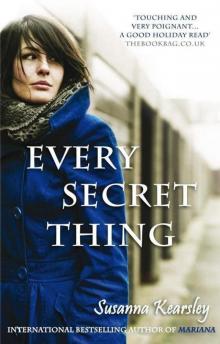 Every Secret Thing
Every Secret Thing The Rose Garden
The Rose Garden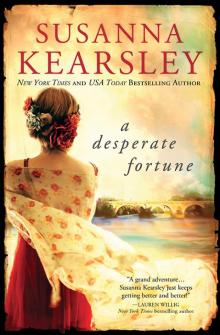 A Desperate Fortune
A Desperate Fortune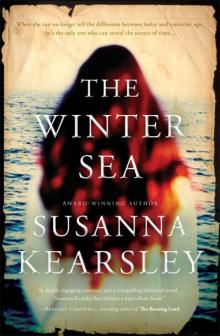 The Winter Sea
The Winter Sea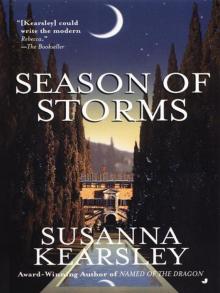 Season of Storms
Season of Storms Mariana
Mariana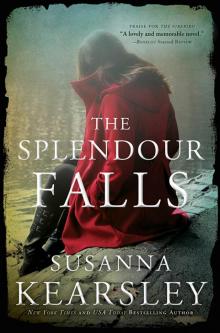 The Splendour Falls
The Splendour Falls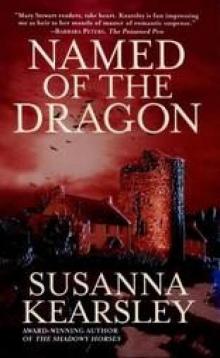 Named of the Dragon
Named of the Dragon Sophia's Secret
Sophia's Secret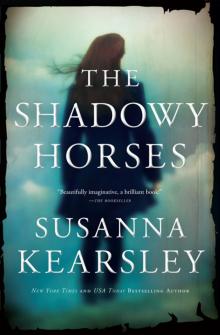 The Shadowy Horses
The Shadowy Horses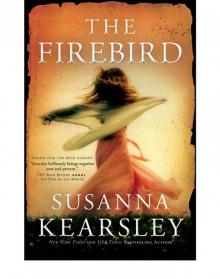 The Firebird
The Firebird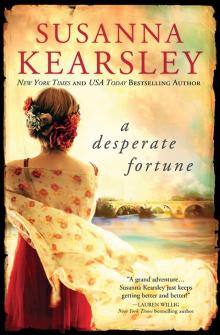 Desperate Fortune
Desperate Fortune